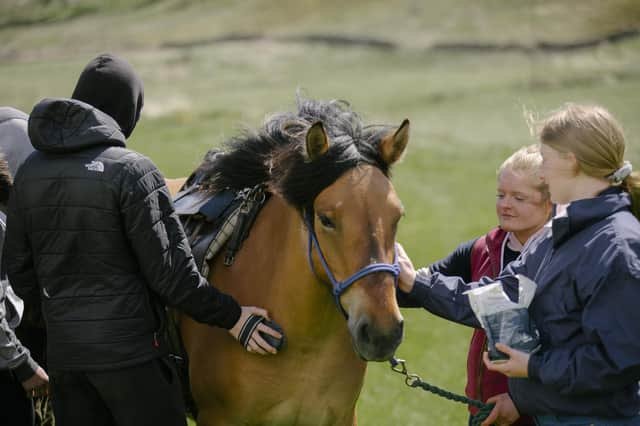Angus pupils head to the hills to learn about estate management


This year’s Estates that Educate programme is larger than ever before with nearly 800 children taking part in hands-on demonstrations of rural conservation and land management skills.
The programme includes primary and secondary school pupils who have been attending sessions in the Angus Glens, Grampian, Southern Uplands, Tayside, Strathdearn and Speyside to benefit from five consecutive weeks of moorland education sessions in a bid to tackle rural depopulation and fill the rural skills gap.
Advertisement
Hide AdAdvertisement
Hide AdThe students have experienced first-hand practical demonstrations of the daily workings of a Scottish estate covering everything from upland sheep farming to river conservation, wading birds, working ponies, renewable energy, to deer management and game cookery.
Estates taking part in the programme include Dunecht, Dalhousie, Glenogil, Gannochy, Lochan and Logiealmond.
Lianne MacLennan, national co-ordinator of Scotland’s regional moorland groups, said the activities are designed in partnership with schools to engage the pupils but are underpinned by a serious aim.
She said: “The Estates That Educate programme stemmed from the need to develop pathways to rural work.
Advertisement
Hide AdAdvertisement
Hide Ad"In many areas of Scotland young people leaving school feel they need to move to Edinburgh or Glasgow for work, and this is a real threat to rural Scotland.
"We want to ensure that rural communities survive and reverse the trend of rural depopulation. There are jobs in rural areas but young people often aren’t aware of them.
"This is a programme of hands-on taster sessions that children wouldn’t otherwise have the opportunity to experience.”
Schools have been involved in setting out the breadth of topics in the national curriculum and which activities fit best with core subject areas.
Advertisement
Hide AdAdvertisement
Hide AdRhona Goss, a teacher at Forfar Academy, said that attending the courses has been extremely beneficial for the youngsters.
She said: “The sessions that have been organised for the pupils have been really impressive. The programme has had a massive investment of time from all involved and we have really appreciated it
"The pupils who have attended each week have gained a huge amount.”
This view was also echoed by Fraser Milne, a teacher at Kirriemuir’s Webster's High School, Kirriemuir.
Advertisement
Hide AdAdvertisement
Hide AdHe added: "The Estates that Educate trips provide an invaluable and highly enjoyable learning experience for our pupils, enriching their understanding of the rural environment and inspiring them to further explore the range of exciting land-based job opportunities that are available in our surrounding area."
One session covered biodiversity, where the students learned how to spot and record various species through sight and sound. Rare birds such as curlew, lapwing, redshank, golden eagle and buzzard are thriving in Scotland’s uplands.
The programme also explained the role of a gamekeeper, a ghillie and a shepherd, with demonstrations of working dogs, working ponies and sheep shearing.
Students also tried out fishing, how to set a fishing rod up and have a go at casting. They have also been learn about tick management in the uplands and how to check yourself and your pet for ticks if you have been out walking in the countryside.
Advertisement
Hide AdAdvertisement
Hide AdColin Lanyon, headkeeper a t Gannochy Estate in Glen Esk, said: “We are really pleased to see more and more young people coming every year to find out about the uplands and their local estates. For many it’s the first time that they have ever tasted venison or grouse and the chance to cook it and to learn about how deer and grouse are managed is a new experience and one that they will remember. Once they start to appreciate all the elements of managing an estate it enables them to connect with not just potential jobs but also the balance between upland farming and moorland conservation.”
Vehicle maintenance is another popular aspect of the programme. Most estates typically use a number of 4 x 4 vehicles and Argocats, so ongoing vehicle maintenance is required to keep an estate running.
Lianne added : “There has never been a more important time to engage with young people and let them know how they can get involved in land management and conservation to protect the species and the countryside that we love.
"We are so lucky in Scotland to be surrounded by such beautiful scenery and an amazing variety of wildlife. Moorland management for red grouse helps protect other rare species and ensures Scotland’s beautiful moorlands can remain timeless and treasured.
Advertisement
Hide AdAdvertisement
Hide Ad“We also have the opportunity to educate young people about the venison and game that is on their doorstep as many of them have never tried game before visiting an estate. The chance to cook and taste game – and even see venison butchery – is an unusual element of the programme and a first for many of them.”
There are more jobs in the fishing and shooting sector in Scotland than those created by Amazon, the BBC, and the salmon farming sector put together – with 4,400 direct full-time jobs and 13,100 full-time-equivalent posts.
This skilled workforce is delivering climate, conservation and biodiversity benefits to Scotland.